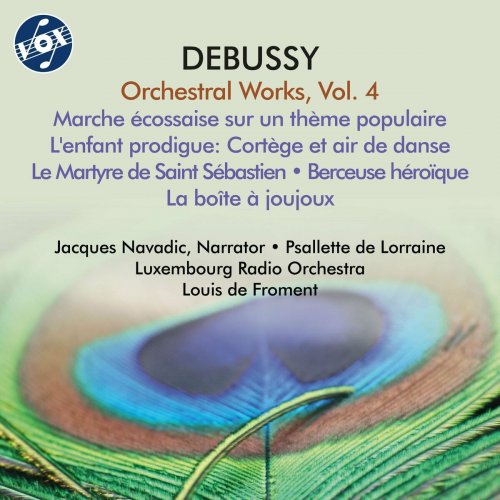
Jacques Navadic - Debussy: Orchestral Works, Vol. 4 (2023)
- Title: Debussy: Orchestral Works, Vol. 4
- Year Of Release: 2023
- Label: Vox
- Genre: Classical
- Quality: FLAC (tracks)
- Total Time: 72:06 min
- Total Size: 229 MB
- WebSite: Album Preview
Tracklist:
01. Marche écossaise sur un thème populaire, L. 77 (Version for Orchestra)
02. La boîte à joujoux, L. 128 (Arr. for Orchestra by André Caplet)
03. L'enfant prodigue, L. 57: No. 4, Cortège et air de danse
04. Le martyre de Saint Sébastien, L. 124 (Version for Narrator, Choir & Orchestra): I
05. Le martyre de Saint Sébastien, L. 124 (Version for Narrator, Choir & Orchestra): II
06. Le martyre de Saint Sébastien, L. 124 (Version for Narrator, Choir & Orchestra): III
07. Le martyre de Saint Sébastien, L. 124 (Version for Narrator, Choir & Orchestra): IV
08. Berceuse héroïque, L. 132 (Version for Orchestra)
01. Marche écossaise sur un thème populaire, L. 77 (Version for Orchestra)
02. La boîte à joujoux, L. 128 (Arr. for Orchestra by André Caplet)
03. L'enfant prodigue, L. 57: No. 4, Cortège et air de danse
04. Le martyre de Saint Sébastien, L. 124 (Version for Narrator, Choir & Orchestra): I
05. Le martyre de Saint Sébastien, L. 124 (Version for Narrator, Choir & Orchestra): II
06. Le martyre de Saint Sébastien, L. 124 (Version for Narrator, Choir & Orchestra): III
07. Le martyre de Saint Sébastien, L. 124 (Version for Narrator, Choir & Orchestra): IV
08. Berceuse héroïque, L. 132 (Version for Orchestra)
Louis de Froment initially studied violin, flute and harmony at the Toulouse Conservatoire, before entering the Paris Conservatoire where his teachers included Louis Fourestier, Eugène Bigot and André Cluytens. He graduated in 1948 with the first prize for conducting and during the following year formed L’Orchestre du Club d’Essai de la Radiodiffusion Française, coming into contact with many young composers of the period. At the same time he founded his own chamber orchestra, and together with the flautist Jean-Pierre Rampal as soloist, toured Europe at its head. He served as musical director for the casinos of Cannes and Deauville until 1956, and of the Vichy between 1953 and 1969; conducted at the Opéra-Comique, Paris, and was chief conductor of the Chamber Orchestra of Radio Nice for the 1958–1959 season. Then de Froment took up the post for which he is best remembered, that of chief conductor of the Symphony Orchestra of Radio Luxembourg, and held this position until 1980, after which he became the orchestra’s principal guest conductor.
With regard to recording, de Froment’s career fell into two clear parts. The first included many recordings for the L’Oiseau-Lyre label on which he conducted the L’Oiseau-Lyre Orchestra Ensemble. The repertoire for this tranche of recordings consisted almost exclusively of seventeenth- and eighteenth-century music, the increased representation of which was a marked feature of the record catalogues of the 1950s. Notable exceptions included Frank Martin’s Harpsichord Concerto with Isabelle Nef as soloist, and Jean Françaix’s Invocation à la volupté. The second tranche of de Froment’s recordings was made with the Radio Luxembourg Symphony Orchestra, predominantly for the Vox label: many of these discs were released on the subsidiary labels Turnabout and Candide. The repertoire for these recordings drew mainly upon French and German music of the nineteenth and early twentieth centuries. Of note amongst these (at times qualitatively variable) recordings are the complete orchestral music of Debussy and all the works for piano and orchestra by Saint-Saëns, with Gabriel Tacchino as soloist. With the Luxembourg Radio Symphony Orchestra de Froment also made a number of miscellaneous recordings for various, usually minor, labels. He maintained his earlier commitment to contemporary music, recording Marcel Landowski’s Les Adiuex, of which he led the first performance in 1959, for La Guilde Internationale du Disque, and Charles Chayne’s Four Illustrations and Trumpet Concerto, with Maurice André, for Erato, also released in the USA on the Musical Heritage label.
With regard to recording, de Froment’s career fell into two clear parts. The first included many recordings for the L’Oiseau-Lyre label on which he conducted the L’Oiseau-Lyre Orchestra Ensemble. The repertoire for this tranche of recordings consisted almost exclusively of seventeenth- and eighteenth-century music, the increased representation of which was a marked feature of the record catalogues of the 1950s. Notable exceptions included Frank Martin’s Harpsichord Concerto with Isabelle Nef as soloist, and Jean Françaix’s Invocation à la volupté. The second tranche of de Froment’s recordings was made with the Radio Luxembourg Symphony Orchestra, predominantly for the Vox label: many of these discs were released on the subsidiary labels Turnabout and Candide. The repertoire for these recordings drew mainly upon French and German music of the nineteenth and early twentieth centuries. Of note amongst these (at times qualitatively variable) recordings are the complete orchestral music of Debussy and all the works for piano and orchestra by Saint-Saëns, with Gabriel Tacchino as soloist. With the Luxembourg Radio Symphony Orchestra de Froment also made a number of miscellaneous recordings for various, usually minor, labels. He maintained his earlier commitment to contemporary music, recording Marcel Landowski’s Les Adiuex, of which he led the first performance in 1959, for La Guilde Internationale du Disque, and Charles Chayne’s Four Illustrations and Trumpet Concerto, with Maurice André, for Erato, also released in the USA on the Musical Heritage label.
Year 2023 | Classical | FLAC / APE
As a ISRA.CLOUD's PREMIUM member you will have the following benefits:
- Unlimited high speed downloads
- Download directly without waiting time
- Unlimited parallel downloads
- Support for download accelerators
- No advertising
- Resume broken downloads


